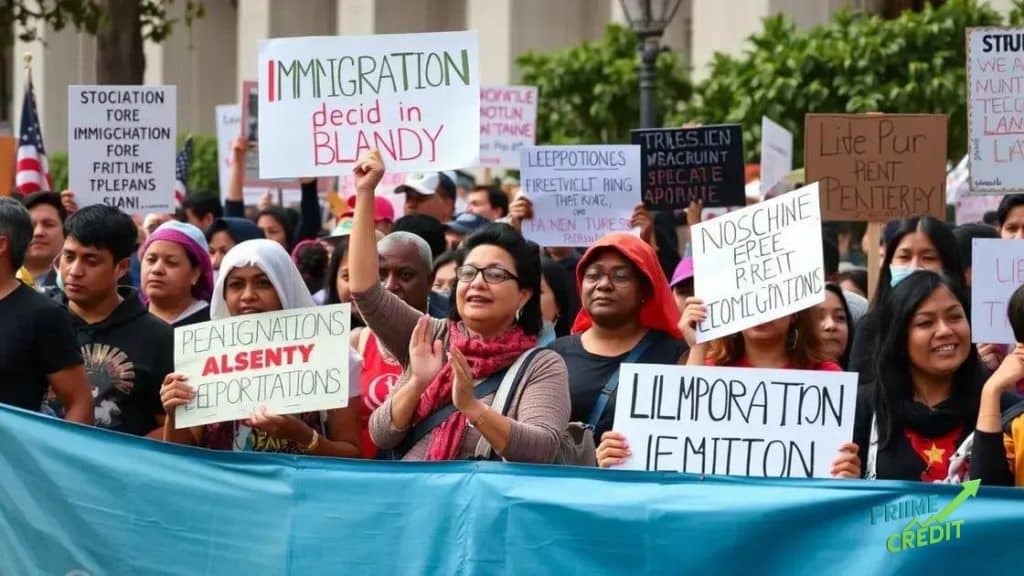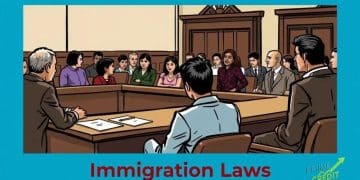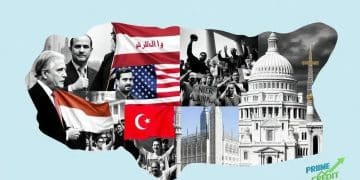Public reaction to federal government’s handling of deportations

The public reaction to the federal government’s handling of deportations reveals a growing demand for humane reforms that prioritize family unity and reflect compassionate immigration policies.
Public reaction to federal government’s handling of deportations is influencing political discussions across the country. As communities grapple with the consequences of these actions, understanding the sentiments behind them becomes crucial. What do people really think, and how does it affect their views on immigration?
Overview of current deportation policies
Understanding the current deportation policies in the United States is essential for grasping the broader landscape of immigration. These policies have evolved significantly in recent years, influenced by changing political climates and public opinion.
Key Features of Deportation Policies
The federal government has established a framework for how deportations are conducted. This includes guidelines on who is prioritized for deportation and the methods used to carry them out. Among the policies, visibility of undocumented immigrants has increased, resulting in a complex relationship with local communities.
- Enforcement priorities: Focus on criminal offenders rather than all undocumented immigrants.
- Use of local law enforcement to identify and detain individuals.
- Increased deportation rates under certain administrations.
- Legal pathways and appeals for affected individuals.
Furthermore, many local jurisdictions have adopted their own policies regarding cooperation with federal authorities. Some cities have become sanctuary cities, limiting their involvement in federal deportation efforts. This approach has led to a patchwork of regulation across the nation, creating confusion and concern among residents.
Impact on Communities
The impact of these deportation policies is felt deeply within communities. Families may be separated as members are detained or deported, leading to emotional and financial hardships. Schools and workplaces also experience the repercussions, as fear often leads to reduced participation from immigrant families.
As communities navigate these challenges, dialogues about reform and humane immigration policies are becoming increasingly important. Engaging in discussions about deportation policies helps raise awareness about the personal stories behind the statistics.
Public opinion trends on deportations
Public opinion on deportations has varied greatly over the years. Understanding these trends helps in analyzing how immigration policies are viewed by different segments of society.
Shifts in Public Sentiment
Polls show a range of views on deportation policies. Initially, many Americans supported strict enforcement. However, as stories of families being torn apart surfaced, public sentiment began to shift towards compassion and understanding. Various surveys indicate that more people are now in favor of reforms that prioritize family unity over deportation.
- Increased support for pathways to legal status.
- Growing empathy towards immigrant communities.
- Concerns about human rights violations associated with deportations.
- Desire for more transparent policies.
Another key aspect is how political messages influence public opinion. As politicians discuss deportations, their words impact perceptions and, in some cases, polarize communities. The media plays a significant role as well, with coverage often framing deportations in a light that affects how readers perceive their necessity or morality.
Demographic Differences
Different demographics show differing opinions on deportation trends. Younger generations tend to advocate for more lenient policies compared to older individuals, who may hold more traditional views about immigration. Furthermore, areas with higher immigrant populations often express more supportive opinions toward immigrants and resettlement efforts.
The ongoing debate about deportation policies is deeply intertwined with identity politics, making it crucial to continue studying these trends. Engaging conversations will shape future policies and public perceptions regarding deportations in the years to come.
Impact of deportations on families and communities
The impact of deportations on families and communities is profound. Families often face separation, leading to emotional distress and financial instability. When a family member is deported, it can create a void that is hard to fill.
Emotional and Psychological Effects
The emotional toll on families affected by deportation is significant. Children, in particular, may experience anxiety, depression, and a sense of loss. Many struggle to understand why a parent is suddenly gone, leading to confusion and fear.
- Increased stress levels among families.
- Children performing poorly in school due to emotional distress.
- Loss of family income when a breadwinner is deported.
- The stigma faced by families within their communities.
As communities navigate these family separations, the overall sense of trust and safety within neighborhoods can diminish. People may hesitate to engage with local authorities, fearing they could be targeted for deportation. This leads to a decline in community cohesion, as fear replaces openness.
Economic Consequences
Deportations can also have broad economic impacts on local communities. Businesses may struggle when employees who are integral to their operations are deported. Additionally, the loss of a family income can push households into poverty.
The economic contributions made by immigrants often go unrecognized in debates about deportation policies. When individuals are deported, their absence impacts not only their families but the economy as a whole.
Community organizations and support groups often step in to help families cope. They provide resources like counseling, legal assistance, and financial aid. These efforts are critical in helping families adjust and heal after a removal.
Media coverage and public response

Media coverage plays a pivotal role in shaping public response to deportation policies. How news outlets report on these issues can influence public sentiment, understanding, and even policy formation.
The Role of Media in Immigration Reporting
Different types of media coverage can lead to varied public responses. For instance, sensationalist stories often incite strong emotions, leading to polarized opinions. Meanwhile, human-interest pieces that highlight personal stories tend to foster empathy among readers.
- Coverage of family separations increases public awareness.
- Investigative reports may expose injustices in deportation practices.
- Social media serves as a platform for activists to share real-life impacts.
- Documentaries and features can provide deeper insights into immigrant experiences.
As public interest in immigration policies grows, media organizations strive to present a balanced view. However, some outlets may cater to specific political ideologies, which can further skew perceptions surrounding deportations. The portrayal of deportees often swings between viewing them as criminals or as victims.
Public Response to Media Coverage
The public response to media narratives surrounding deportations can lead to social action. When communities see coverage of the struggles faced by immigrant families, they may mobilize for support. Protests, petitions, and advocacy groups often form in response to media stories that depict injustices.
Moreover, negative portrayals can prompt backlash. Activists may push back against misleading information, aiming to correct misconceptions about immigrants and their contributions to society. As discussions evolve, so does the public’s willingness to engage in conversations about reforming deportation policies to be more humane.
Future implications of immigration policies
The future implications of immigration policies, particularly regarding deportations, are subjects of significant concern and discussion. As societies evolve, so do the perceptions and practices surrounding immigration.
Trends in Immigration Legislation
Recent legislative movements suggest a shift towards more comprehensive reforms. Policymakers are increasingly acknowledging the need for systems that prioritize human rights and family unity. This shift may result in changes that redefine how deportations are handled in the future.
- Potential pathways to legal status for undocumented immigrants.
- Revisiting asylum processes to make them more accessible.
- Heightened focus on community involvement in immigration decisions.
- Increased cooperation between federal and local jurisdictions.
Community activism has become even more influential in shaping policies. Grassroots movements advocating for immigrant rights can push for reforms that reflect more humane practices. Their efforts often spotlight the need for a fair and just immigration system.
Economic and Social Effects
Future immigration policies will likely have significant economic implications. By providing pathways for legal residency, communities can benefit from the contributions of immigrant workers. Economic growth can come from stable, legally authorized workers participating fully in society.
Socially, a shift toward more inclusive immigration policies may promote acceptance and integration of diverse cultures. This could lead to richer communities that value diversity and understand the importance of immigrants in shaping society.
As discussions surrounding deportation policies continue, the influence of public opinion on lawmakers will be vital. Advocating for a balanced review of policies can foster a better understanding of the human experiences intertwined with immigration.
In conclusion, the impact of deportation policies on families and communities is profound. As public opinion evolves, it shapes future legislation, emphasizing compassion and understanding. Community activism plays a crucial role in advocating for reforms that prioritize human rights and family unity. Looking ahead, a focus on more inclusive policies can lead to stronger, healthier communities. Together, we can work towards a fair immigration system that respects the dignity of all individuals.
FAQ – Frequently Asked Questions about Deportation Policies
What are the main impacts of deportation on families?
Deportation can cause emotional distress, financial instability, and separation of family members, which negatively affects family dynamics.
How does public opinion influence immigration policies?
Public opinion shapes policies by expressing collective views that can pressure lawmakers to reconsider and reform deportation practices.
What role do community activists play in immigration reform?
Community activists advocate for humane reforms and push for policies that prioritize family unity and human rights.
What future changes can we expect in immigration policies?
Future policies may focus on inclusivity, providing pathways to legal status for undocumented immigrants and promoting community-based solutions.





